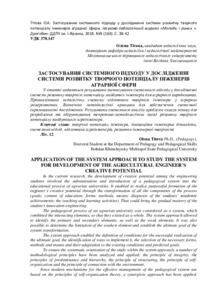Будь ласка, використовуйте цей ідентифікатор, щоб цитувати або посилатися на цей матеріал:
http://elar.tsatu.edu.ua/handle/123456789/9811| Назва: | Застосування системного підходу у дослідженні системи розвитку творчого потенціалу інженерів аграрної сфери |
| Інші назви: | Application of the system approach to study the system for development of the agricultural engineer’s creative potential |
| Автори: | Тітова, Олена Анатоліївна Титова, Елена Анатольевна Titova, Olena |
| Ключові слова: | творчий потенціал інженера;інноваційна інженерна діяльність;системний підхід;підготовка агроінженерів;розвиток інженерної творчості;creative potential of an engineer;innovative engineering;system approach;agricultural engineering education;development of engineering creativity |
| Дата публікації: | 2018 |
| Серія/номер: | . Науково-педагогічний журнал «Молодь і ринок»;№ 9 (164) (С. 38-42) |
| Короткий огляд (реферат): | UK: У статті подаються результати застосування системного підходу у дослідженні системи розвитку творчого потенціалу майбутніх інженерів для аграрного виробництва. Проаналізовано педагогічну систему підготовки творчого інженера у аграрних університетах. Визначено методологічні принципи для забезпечення системної спрямованості дослідження. Результати системного аналізу проблеми склали основу для розроблення та обґрунтування теоретико-методологічних засад розвитку творчого потенціалу майбутнього агроінженера. EN: In the current research, the development of creative potential among the engineering students involved the substantiation and introduction of a pedagogical system into the educational process of agrarian universities. It enabled to realize purposeful formation of the engineer’s creative potential through the transformation of all the components of the process (goals; content of education; forms, methods, means; diagnosis of the students’ academic achievements; the teaching and learning activities). That could bring the gradual mastery of the student's innovation engineering. The pedagogical process of an agrarian university was considered as a system, which combined the interacting elements, so that they existed as a whole. The system approach allowed to identify the primary and secondary elements, as well as the weak elements. It was also possible to determine the limitation of the weakest element and establish the ultimate goal of the system transformation. The system approach enabled the definition of conditions for the successful realization of the ultimate goal, the identification of ways to implement it, the selection of the necessary forms, methods and means and their adaptation to the existing conditions and predicted goals. To ensure the systematic orientation of the study within the system approach, a number of methodological principles have been analyzed and applied: the principle of integrity, the principles of predominance and hierarchy, the principle of structuring, the principle of self-organization and the principle of connection with the environment. Since modern mechanisms for the effective management of the pedagogical system are based on the principles of self-organization theory, a synergistic approach has been applied That allowed to investigate qualitatively new structures, which arose as a result of the synthesis, combination, and cooperation between the components of the pedagogical process in conditions of randomness and necessity, when the basis for the future specialist's development was real situations, problems and tasks. The process of interaction between the elements and subsystems became constructive by overcoming contradictions and conscious choices from a large number of alternatives. |
| URI (Уніфікований ідентифікатор ресурсу): | http://elar.tsatu.edu.ua/handle/123456789/9811 |
| Розташовується у зібраннях: | кафедра Іноземні мови |
Файли цього матеріалу:
| Файл | Опис | Розмір | Формат | |
|---|---|---|---|---|
| Тітова_2018_7.pdf | 1.01 MB | Adobe PDF |  Переглянути/Відкрити |
Показати повний опис матеріалу
CORE Recommender
Перевірити
Усі матеріали в архіві електронних ресурсів захищені авторським правом, всі права збережені.
